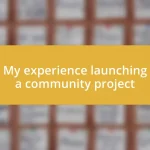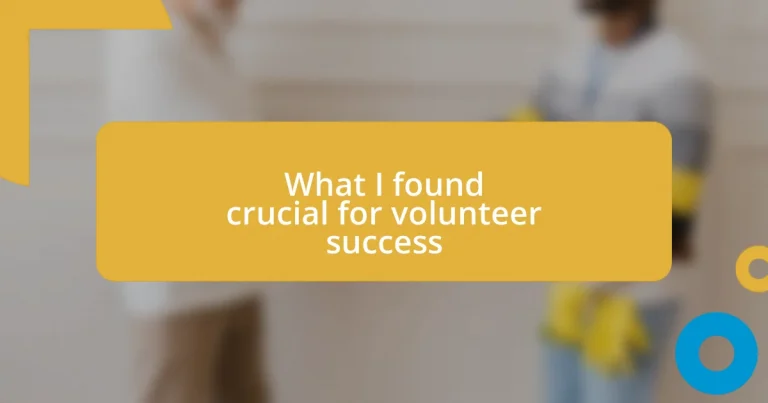Key takeaways:
- Understanding volunteer motivations is crucial; a mix of intrinsic and extrinsic factors drives engagement and personal growth.
- Establishing clear and measurable goals enhances focus, motivation, and a sense of ownership among volunteers, leading to more meaningful contributions.
- Fostering a positive team culture, through support, recognition, and open communication, significantly enriches the volunteer experience and strengthens group dynamics.
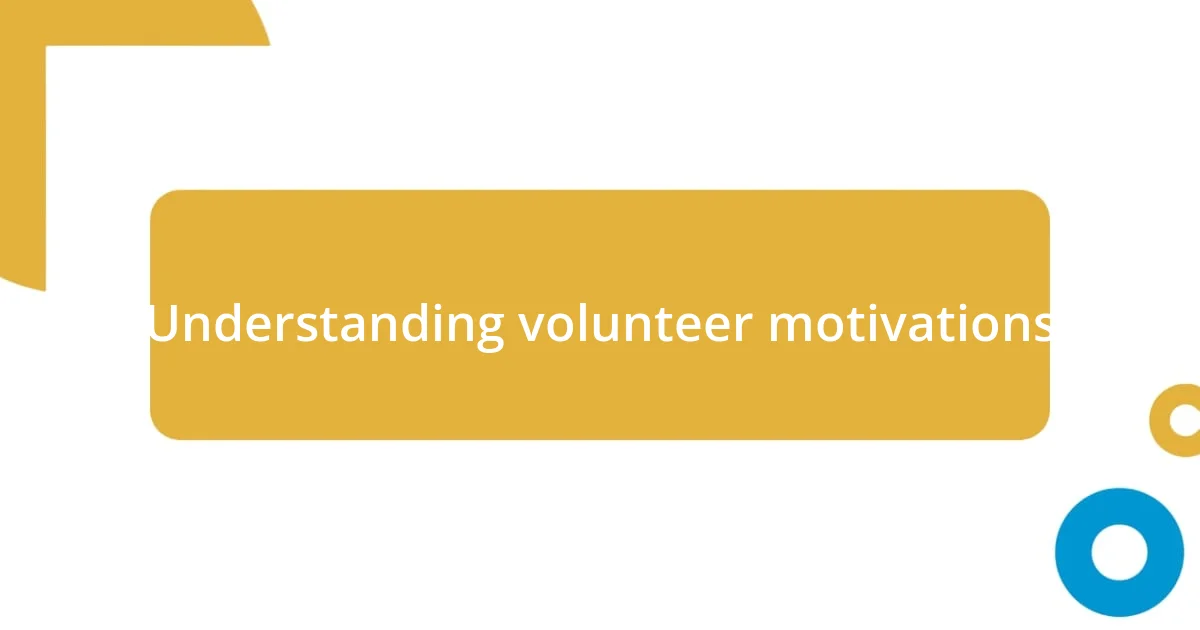
Understanding volunteer motivations
Understanding what drives someone to volunteer is truly fascinating. In my experience, many people are propelled by a mix of intrinsic and extrinsic motivations. For example, during my time volunteering at a local animal shelter, I found that my love for animals pushed me to contribute, but I also developed valuable connections and skills, which motivated me to keep coming back.
Think about it: what’s your reason for considering volunteer work? Is it the desire to make a difference, or perhaps the chance to meet like-minded individuals? A friend of mine started volunteering during the pandemic, not just to help others but also to combat her feelings of isolation. She shared how fulfilling it felt to connect with people in need, which ultimately filled her own emotional cup while serving the community.
Some volunteers are spurred by the need for personal growth and development. I remember my first day working with underprivileged children. The challenges I faced stretched my tolerance and adaptability, teaching me lessons I never anticipated. It’s interesting how stepping outside our comfort zones can illuminate our passions and reveal our motivations in ways we might not have recognized before.
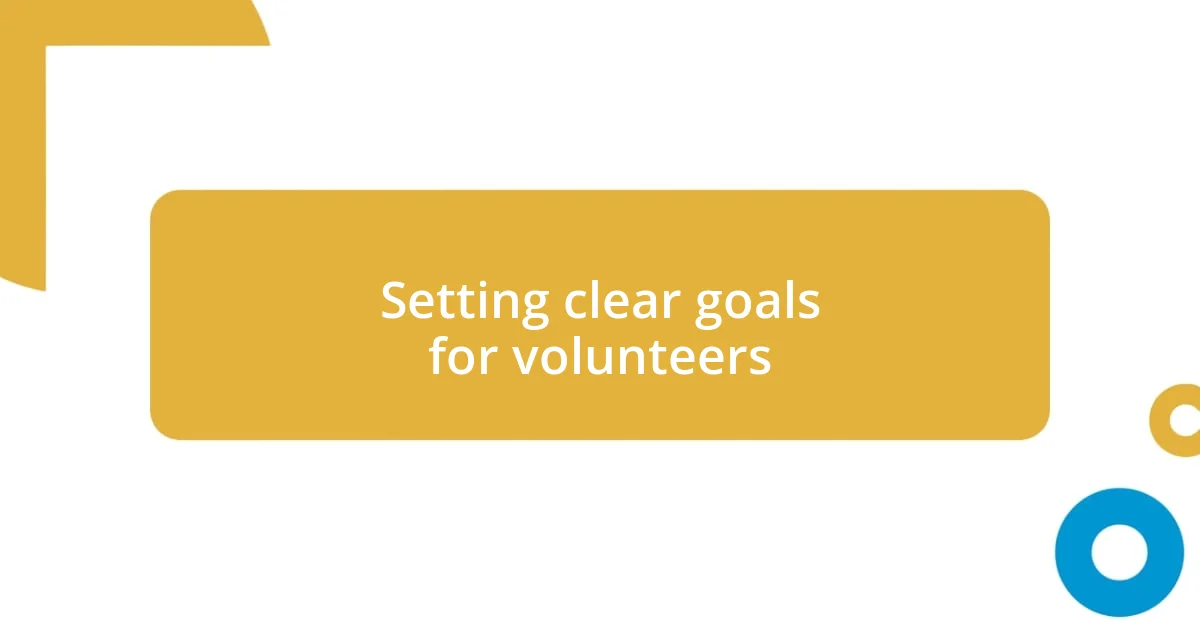
Setting clear goals for volunteers
Setting clear goals for volunteers is truly essential for fostering a productive and satisfying experience. I’ve learned that when volunteers understand their objectives, they feel more engaged and focused. For instance, during a community garden project, we delineated specific goals like improving biodiversity and enhancing local outreach efforts. This clarity made everyone more invested in their roles.
Moreover, I find that establishing measurable goals can motivate volunteers significantly. In my volunteering days, we set weekly targets for planting and community workshops. Each time we met those benchmarks, it created a sense of achievement that kept our spirits high. It’s amazing how a little structure can turn an exciting endeavor into something even more rewarding.
Sometimes, it’s also valuable to involve volunteers in the goal-setting process. I once participated in a cleanup drive, and the team collectively decided to focus on waste reduction impact instead of just litter collection. This inclusion not only boosted morale but also made the volunteer effort feel more meaningful. Reflecting on this experience, I realized that when volunteers connect their personal aspirations to the overarching goals, the collective effort becomes truly powerful.
| Characteristic | Impact |
|---|---|
| Clarity of Purpose | Enhances focus and engagement |
| Measurable Targets | Boosts motivation through achievement |
| Inclusive Goal-Setting | Fosters a sense of ownership and meaning |
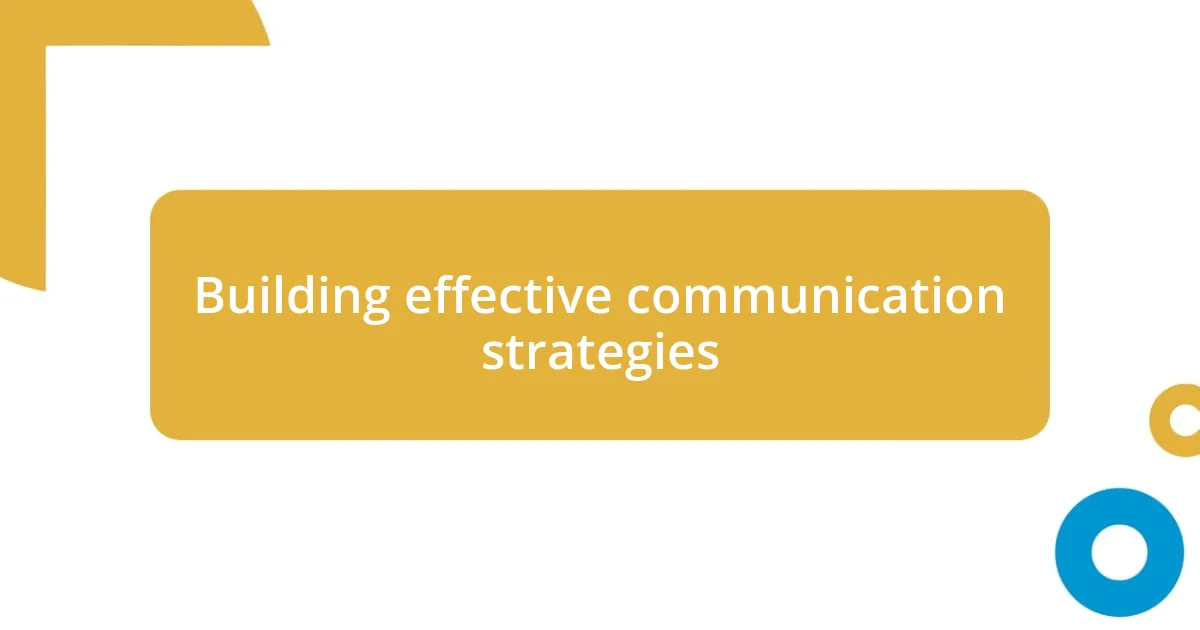
Building effective communication strategies
Building effective communication strategies is a cornerstone of successful volunteering. I recall a time when I joined a coastal cleanup event with a diverse group of volunteers. At first, there was a palpable tension as everyone had different ideas about how to tackle the project. However, as we started sharing our thoughts openly, the atmosphere shifted. I felt a sense of camaraderie emerge, which sparked creativity and enthusiasm. It’s remarkable how transparent communication can transform a group dynamic from uncertainty to unity.
Here are some effective communication strategies I’ve found invaluable:
-
Regular Check-ins: Establishing a routine for updates helps everyone stay aligned. I remember a weekly email recap during my last volunteer stint was effective in keeping everyone informed and motivated.
-
Active Listening: I learned that truly hearing others fosters trust. During team meetings, giving everyone a chance to voice their thoughts made all members feel valued and encouraged collaboration.
-
Feedback Loops: Creating opportunities for feedback is crucial. I took part in a project where we regularly discussed what was working and what wasn’t, which led to improvements in our approach and increased engagement.
-
Adaptability: Being flexible in communication styles can make a huge difference. I once had to pivot from formal presentations to casual group chats to accommodate various comfort levels, and it genuinely opened up dialogue among the volunteers.
Embracing these strategies can elevate the volunteer experience and ensure that everyone feels heard, engaged, and valued.
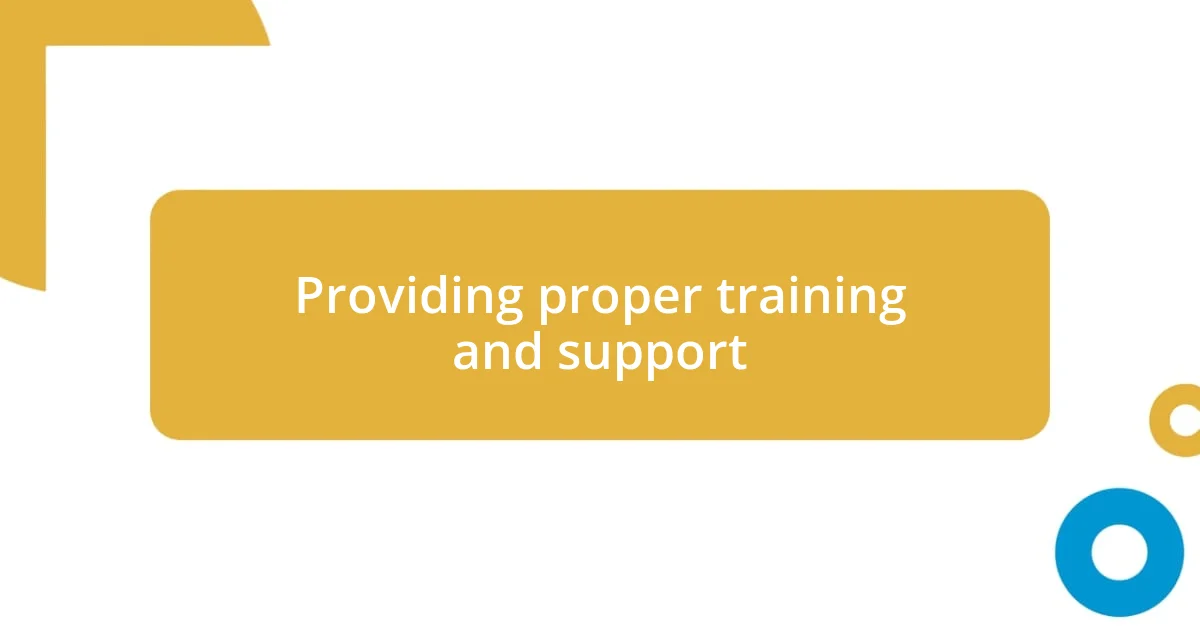
Providing proper training and support
Providing proper training and support is a game-changer in the world of volunteering. I remember stepping into a new role at a youth mentoring program, feeling a mix of excitement and nervousness. However, the thorough training we received made all the difference. Our coordinator not only covered the basics but also included scenarios we might encounter, which empowered me and the other volunteers to tackle challenges with confidence. How often have you approached a new task feeling unsure? With the right training, that uncertainty fades and is replaced with eagerness to contribute.
Moreover, ongoing support is equally crucial. During my time with a literacy program, we had monthly workshops to share experiences and discuss hurdles. These sessions were like a breath of fresh air; they fostered a sense of community and assurance that we were all in it together. I often found myself walking away from those workshops inspired, realizing that support wasn’t just about resolving issues—it was about celebrating our collective progress. Does your volunteer organization prioritize this kind of ongoing dialogue?
Finally, I believe in the power of mentorship within volunteer roles. Once, I was paired with a seasoned volunteer who took the time to guide me through my responsibilities, highlighting not just the “how” but also the “why.” This personalized approach deepened my understanding of the impact we were making, and I eventually felt confident enough to mentor new volunteers, creating a cycle of support. It struck me how vital it is to have a strong support system that encourages learning and sharing. Isn’t that the essence of volunteering—building connections and empowering each other to succeed?
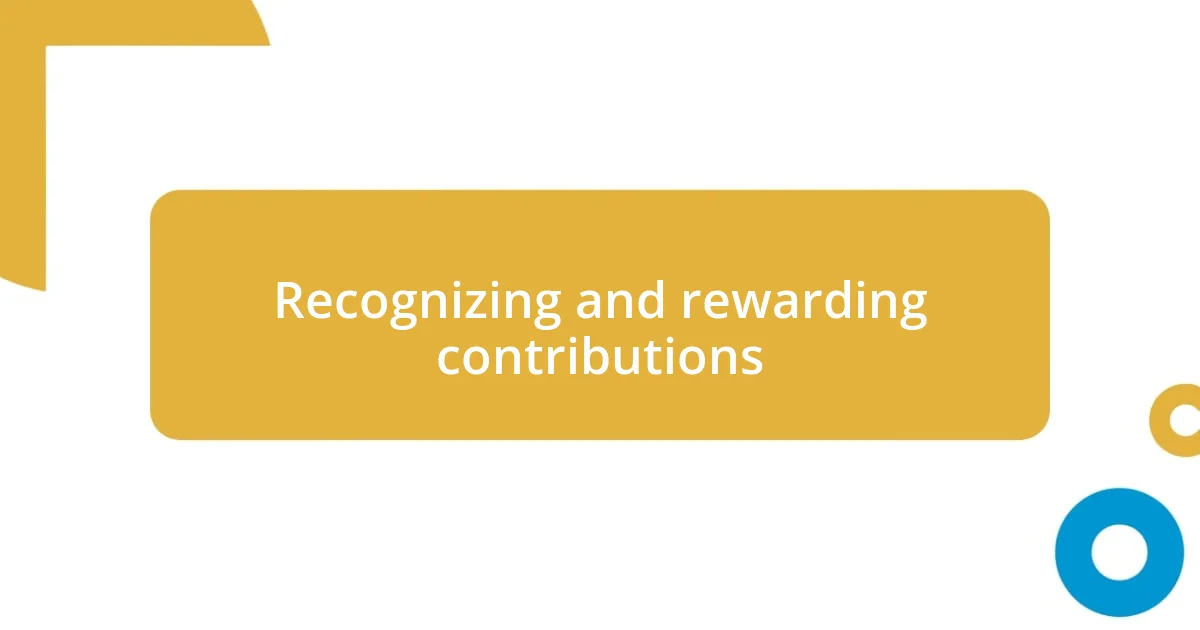
Recognizing and rewarding contributions
Recognizing contributions is often the heart of volunteer satisfaction. I can recall a time when I participated in a community garden project; after weeks of hard work, we were treated to a “Volunteer Appreciation Day.” Seeing my fellow volunteers beaming as they received certificates and small tokens of gratitude truly reinforced the sense that our efforts mattered. Have you ever experienced that rush of joy when your hard work is acknowledged? It’s powerful, isn’t it?
Another approach I’ve seen work wonders is implementing a shout-out system during meetings or social media. I fondly remember a project where we had a “Volunteer of the Month” feature; it was exciting to see my fellow volunteers recognized for unique achievements. This small act not only boosted morale but sparked a sense of friendly competition and motivation. Isn’t it fascinating how simple words of appreciation can uplift an entire team?
Moreover, celebrating milestones together builds both community and personal investment in the cause. At a recent fundraising event, we took time to toast our progress, acknowledging everyone’s role in reaching our goals. That genuine moment of togetherness created lasting bonds among us. Have you considered how celebrating collective achievements can strengthen your volunteer group? I believe it’s essential to weave recognition into the fabric of your volunteer culture—it transforms contributions into a shared legacy.
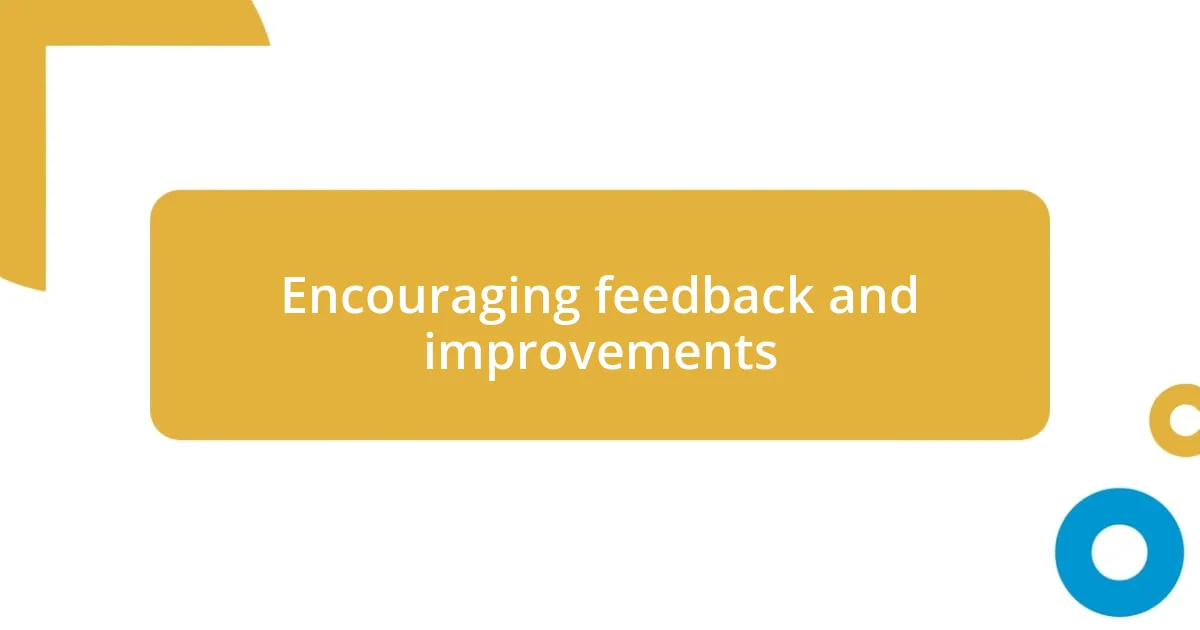
Encouraging feedback and improvements
Encouraging feedback and improvements is vital in nurturing a thriving volunteer environment. I recall a situation where our team conducted a feedback session after a large event. At first, I was hesitant to share my thoughts, fearing they might not resonate. But when I saw how open my fellow volunteers were about sharing their experiences, it inspired me to speak up. This collective openness not only improved our future events but also made everyone feel valued. Have you ever experienced a transformative moment like that when feedback led to significant changes?
Additionally, I’ve learned that being receptive to feedback can significantly enhance a volunteer program. There was a time when I suggested a new approach to our weekly meetings—shifting from a lecture-style format to more interactive discussions. The leadership team took my input seriously, and implementing this change turned those meetings into energizing brainstorming sessions. I found myself looking forward to these gatherings, and it deepened my connection to the cause. Considering the potential impact, how well does your organization encourage volunteers to voice their ideas?
Lastly, continuous improvement should be a shared responsibility within the volunteer team. During another program, we adopted a practice where each volunteer would share one improvement idea at the end of every month. It was inspiring to see how creative and engaged everyone became, knowing their suggestions were taken seriously. Personally, this practice not only enriched the volunteer experience but also fostered a culture of innovation. How can you create an environment where constructive suggestions flow freely? I firmly believe that a culture of feedback paves the way for personal and collective growth, fundamentally enhancing the volunteer journey.
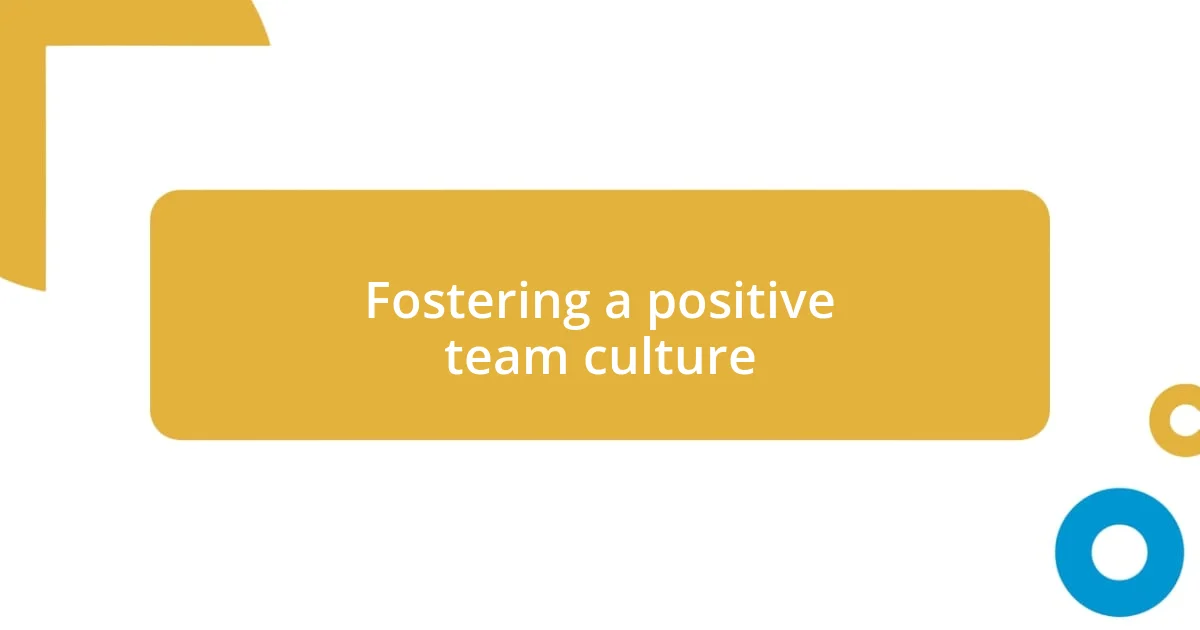
Fostering a positive team culture
Fostering a positive team culture is essential to the volunteer experience. I still remember my first day as a volunteer; there was a warmth in the atmosphere that immediately made me feel welcome. Team members greeted me with smiles and shared stories about previous projects, creating a sense of belonging right away. Have you ever stepped into a new environment and felt that instant connection? It’s incredible how a friendly culture can break down barriers and encourage collaboration right from the start.
As we worked together, that supportive atmosphere shone through during challenges. There was a project where we faced unexpected setbacks, and instead of panic, I witnessed my teammates rallying together to find solutions. Someone suggested a brainstorming session, and the room buzzed with ideas and laughter. In moments like these, I realized the power of trust among teammates. How often do you see such unity in your volunteer activities? I believe that when a team supports each other wholeheartedly, it creates resilience that can weather any storm.
Celebrating individual strengths is another key aspect of nurturing a positive culture. I remember a volunteer in our group who had a knack for graphic design. At one point, we needed marketing materials for an upcoming event, and instead of delegating tasks, we encouraged everyone to use their skills. It was exhilarating to see her shine, and she ended up creating stunning promotional content that captured our mission beautifully. How often do you celebrate the unique talents within your team? Recognizing and valuing each person’s contribution cultivates pride and ownership, essential elements in building a strong and positive volunteer team.







